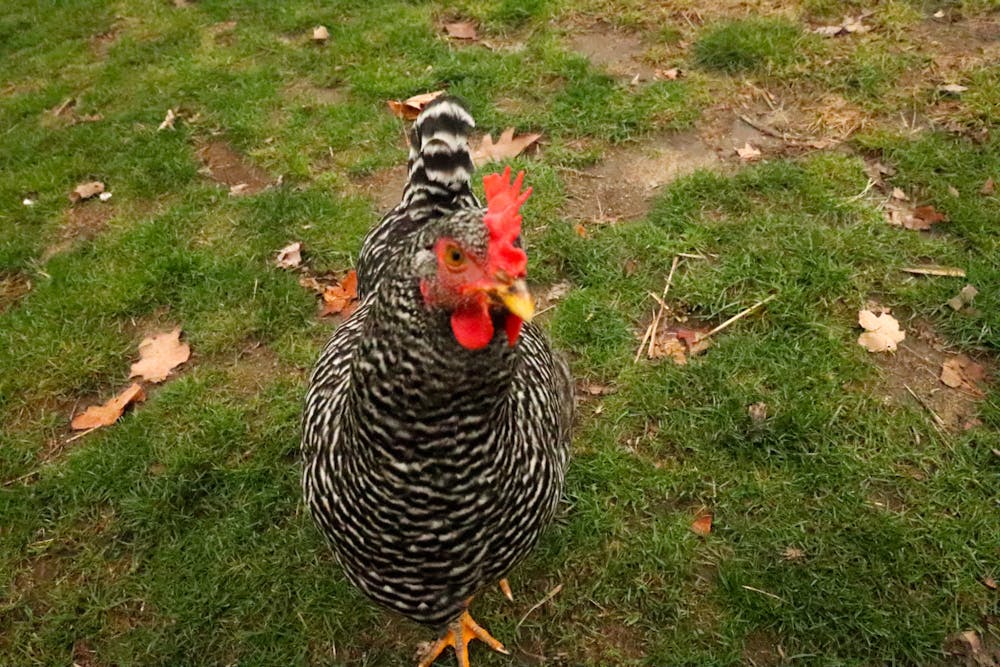Which came first?
City incubating private poultry plan

A chicken looks at the camera on Sunday, Nov. 10 at Papa's Pumpkin Patch. (CM-Life | Mary Nowosacki)
The Mount Pleasant City Commission is crowing over a proposal that could allow residents to keep small flocks of chickens on their property.
While the idea introduced during a board work session Monday is far from fully fledged, commissioners are brooding on what it could look like for residents to keep personal poultry on their property.
“I have owned chickens, I have raised them many times in my lifetime,” Commissioner Amy Perschbacher said. “I would not do it again. But I am not against people raising chickens.”
Policy Research Intern Colton Brewer spent part of the summer researching state and city laws related to backyard poultry. After taking a closer look at proposed changes in state law and regulations in communities across Michigan — as well as conducting a focus group — he laid the groundwork for a policy here.
Among his recommendations:
· Chicken keepers would be required to have a city-issued permit, good for one to two years, subject to a $150 initial and $75 renewal fee.
· Applicants would be subject to a property inspection, as well as semi-annual compliance inspections. Those checks could be increased if there were reason to suspect the animals were being neglected or treated poorly.
· The commercial sale of eggs or produce would be prohibited.
· The animals would be required to be kept in a secured coop. While Brewer acknowledged that, “there’s not necessarily any such thing as perfectly secure in this situation,” the minimum requirement would include: deeply buried heavy-grade fencing; sturdy construction with complex locking doors and a solid roof; gaps filled with small-gauge mesh to protect against mice and snakes; and fully sealed, locking feed containers.
· Coops would need to be set back at least 10 feet from the property line, and no fewer than 40 feet from adjacent homes, unless written permission is obtained from the other homeowners.
· Renters would be required to get the written permission of their landlords to keep birds, and flocks would be prohibited in multi-unit housing.
· Coops would be cleaned at least weekly and the waste disposed of properly.
In the case of an odor or other complaint, code or law enforcement would make contact with the animal owner. Predator complaints would be handled by Animal Control.
Chicken keepers who were found in violation of minor infractions would be subject to a three-strike rule under Brewer’s recommendation. In the case of extreme neglect or abuse, their permit could be pulled on the first violation.
“Backyard chickens are not commercial chickens,” Brewer told the board. “It’s not a commercial venture, it’s more for the fun of keeping chickens and the benefit of fresh eggs in the morning.”
But the proposed guidelines quickly proved to be a chicken-or-egg situation, as commissioners took issue with and requested further information on some of the plan. Among the topics still incubating were the cost of the permit, the frequency of a permitting renewal and inspection and permission requirements.
Some balked—or rather, bawked—at the proposed price tag, noting that chicken keeping comes with a hefty start-up fee.
“I couldn’t tell you why the chicken crossed the road. I don’t know because I don’t see chickens all over Mount Pleasant,” newly sworn Commissioner Ryon Skalitzky said. “If you’re going to be investing $800, $1,000 to build a chicken coop, you already have some skin in this game. To try to punish people for having a chicken seems unnecessary.”
Rather, he suggested the initial permitting fee could stay at $150 to cover the cost of sending city inspectors to the property. But renewals, he said, could be reduced.
“To have somebody be able to call in and complain and to have the permit pulled due to (extreme) negligence, and now they’re out the cost of the pen, the permit and the cost of the birds seems like a deterrent to being a bad actor,” he said.
Other commissioners questioned the health impact of birds in backyards.
Without proper sanitation methods in place, backyard poultry can be carriers of, among other things, salmonella, e. coli and bird flu, according to the Centers for Disease Control and Prevention.
“This is a conundrum for me,” Vice Mayor Maureen Eke said. “I grew up with chickens, my father had poultry, and I understand. What I’m thinking about is a whole range of things: you don’t want roosters, they smell when people don’t take care of their pens.
“And then you (could) have an outbreak of bird flu. … That’s what I’m saying”
The conversation arose as interest in backyard chicken keeping — and egg prices —soars across the nation. According to a 2024 study published in the National Library of Medicine found that chickens are the third-most common pet in Western nations.
In the end, the board directed Brewer to further flush out some details and asked whether the community could provide feedback earlier in the ordinance-drafting process.
“We like your ideas,” Commissioner Mary Alsager told Brewer. “We’ve given you some feedback, and maybe bring it back another time so we can discuss it and have a public hearing and maybe get something on the books.”






